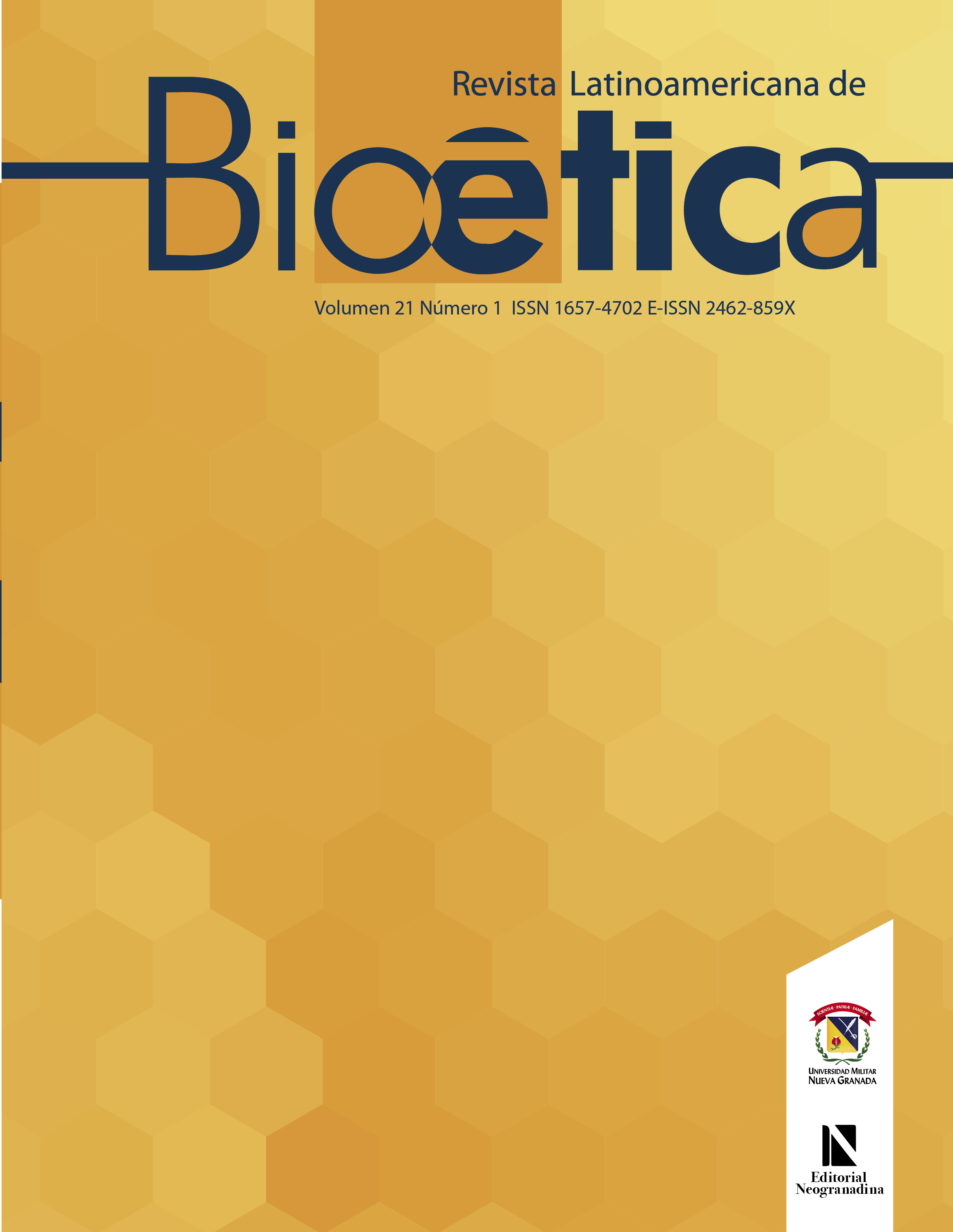Reasons to Define Death and its Criticism
Abstract
Over fifty years from Harvard’s report, the redefinition proposed for death still poses problems and has not reached international consensus. The possibility to transplant vital organs and the progress of artificial support to maintain some substantive functions raised the need to redefine the notion of death. Proposing new definitions also gives place to new ethical and technical questions. In this context we present some of the main reasons and criticism to the intention to define death as encephalic death. For such reasons we analyze some of the criticism made on this point by Hans Jonas, as well as challenges to his position. On the other hand, we present some of the criteria diagnostic tests are based on, and the lack of consensus in this regard. With his analysis we aim at showing that the different viewpoints to define death, despite not reaching agreement among different communities, require continued analysis and debate in order to give supported attention to the factors motivating the redefinition of death.
Downloads
References
Abbagnano N. Diccionario de filosofía. Segunda edición. México: FCE; 1974.
Aristóteles. Acerca del alma. Primera edición. Martínez TC, editor. Madrid: Gredos; 1978.
Becchi P. Muerte cerebral y trasplante de órganos. Un problema de ética jurídica. Primera edición. Madrid: Editorial Trotta; 2007.
Bromberger S. On what we know we don't know. Explanation, theory, linguistics, and how questions shape them. Press TUoC, ed. Chicago; 1992. Disponible en: https://web.stanford.edu/group/cslipublications/cslipublications/bromberger-corpus/On-What-We-Know-We-Dont-Know.pdf
Casati, RO, Varzi, AC. Events. In: The Stanford encyclopedia of philosophy. Zalta EN, editor; 2010.
Eichinger T. Brain death, justified killing and the zombification of humans - Does the transplantation dilemma require new ways of conceptualizing life and death? In: Jox R, Assadi G, Marckmann G, eds. Organ transplantation in times of donor shortage. International library of ethics, law, and the new medicine, vol 59. Springer, Cham; 2017. https://doi.org/10.1007/978-3-319-16441-0_2
Escalante JL, Escudero D. Conclusiones de la III Conferencia de consenso de la semicyuc, Muerte encefálica en las Unidades de Cuidados Intensivos. Medicina Intensiva 2000;24(4): 193-97. https://doi.org/10.1016/S0210-5691(00)79582-9
Escudero D. Diagnóstico de muerte encefálica. Medicina Intensiva. Hospital Universitario Central de Asturias. Oviedo. 2009; 33(4):185-95. https://doi.org/10.1016/S0210-5691(09)71215-X
Escudero D. Muerte encefálica en Iberoamérica. Medicina Intensiva. 2009; 33 (9): 415-423. https://doi.org/10.1016/j.medin.2009.07.011
Escalante JL. Muerte encefálica. Evolución histórica y situación actual. Medicina Intensiva. 2000; 24 (3). https://doi.org/10.1016/S0210-5691(00)79569-6
García-García E. Diabetes insípida. Endocrinología Pediátrica. Hospitales Universitarios Virgen del Rocío. 2011; 1(1).
González-González N. Medicalización de la muerte. Elementos de discusión y análisis para un abordaje crítico desde las Ciencias Sociales. Revista Culturales. 2005; 6(1): 1-27. https://doi.org/10.22234/recu.20180601.e350
García-Porrero JA, Hurlé JM. Neuroanatomía humana. España: Editorial Médica Panamericana SA; 2015.
Granero J, Fernández C, eds. Soporte vital básico y avanzado. Basado en las recomendaciones ERC-2010. Almería; 2011. Disponible en: https://core.ac.uk/download/pdf/143457138.pdf
Humphry, D, Wickett, A. El derecho a morir. Comprender la eutanasia. España: Tusquets Editores; 2005.
Jonas H. Técnica, medicina y ética. Primera Edición. España: Paidós; 1997.
Diario Oficial de la Federación. Ley General de Salud. México; 2018.
Lizza JP. Persons, humanity and the definition of the death. Baltimore: The Johns Hopkins University Press; 2006.
Miller FG. Death and organ donation. J. Med Ethics. 2009; 35. https://doi.org/10.1136/jme.2009.030627
Monzón JL. Recomendaciones de tratamiento al final de la vida del paciente crítico. Med Intensiva. 2008; 32(3). https://doi.org/10.1016/S0210-5691(08)70922-7
Viniegra VL. El reduccionismo científico y el control de las conciencias. Parte I. Boletín Médico del Hospital Infantil de México. 2014; 71(4). https://doi.org/10.1016/j.bmhimx.2014.05.001
Souza, J.P., Oliveira-Neto, A., Surita, F.G. et al. The prolongation of somatic support in a pregnant woman with brain-death: a case report. Reprod Health 3, 3 (2006). https://doi.org/10.1186/1742-4755-3-3
Singer P. Repensar la vida y la muerte. El derrumbe de nuestra ética tradicional. Barcelona: Editorial Paidós; 1997.
Shewmon DA. Chronic "brain death": Meta-analysis and conceptual consequences. American Academy of Neurology. 2009 Septiembre; 7 (51). https://doi.org/10.1212/WNL.51.6.1538
Secretaría de Salud. Programa de acción: trasplantes. México; 2001.
Rodríguez D. Muerte cerebral y trasplante de órganos. Aspectos internacionales y éticos. España: Universidad de Salamanca; 2008.
Rivera-López E. Ética y trasplante de órganos. México: Fondo de Cultura Económica; 2001.
Platón. Fedón. Diálogos III. España: Editorial Gredos; 1988.
Tamayo RP. La construcción de la bioética. Vol. 1. México: Fondo de Cultura Económica; 2008.
Pernick M. Death: beyond whole-brain criteria. Publishers KA, editor. US: Springer; 1988.
Moreno-Ruiz N. Mora-Pabón G. Heparina no fraccionada en el manejo del síndrome coronario agudo. Rev Fac Med [Internet]. 2007 Mar; 55( 1 ): 43-57.
Monzón JL. Recomendaciones de tratamiento al final de la vida del paciente crítico. Medicina Intensiva. 2008; 32(3). https://doi.org/10.1016/S0210-5691(08)70922-7
Martin-Fumadó C, Gómez-Durán E, Galán-Serrano J, Barbería-Marcalaina E, Arimany-Manso J, Parera-Ruize A. Toma de decisiones al final de la vida y ante el diagnóstico de muerte encefálica. Revista Española de Medicina Legal. 2017; 43(3). https://doi.org/10.1016/j.reml.2017.05.003
Taborda M, Coalla M, Lépore N, Sacco P, Grottasanta S, Corchuelo D, Braida N. Disociación clínico-imagenológica en determinación de muerte encefálica. Neurología Argentina. 2019; 11(2). https://doi.org/10.1016/j.neuarg.2019.02.005
Díaz-Águila H. Muerte encefálica. Rev Cuba Med Int Emerg [revista en Internet]. 2018; 17(0). Disponible en: http://www.revmie.sld.cu/index.php/mie/article/view/444
Barreto V, Unigarro L, Del Pozo G. ¿Cuánto conocen los médicos sobre el diagnóstico y certificación de muerte encefálica? Rev Fac Cien Med (Quito). 2017; 42(2). https://doi.org/10.29166/ciencias_medicas.v42i2.1449
A definition of irreversible coma: report of the Ad Hoc Committee of the Harvard Medical School to examine the definition of brain death. JAMA. 1968 Aug 5; 205(6): 337-40. https://doi.org/10.1001/jama.205.6.337
Bernat JL, Culver CM, Gert B. On the definition and criterion of death. Ann Intern Med. 1981 Mar;94(3):389-94. doi: https://doi.org/10.7326/0003-4819-94-3-389. PMID: 7224389.
Bein T, Müller T, Citerio G. Determination of brain death under extracorporeal life support. Intensive Care Med. 2019 Mar;45(3):364-366. https://doi.org/10.1007/s00134-018-05510-z
Rabinstein AA. Coma and Brain Death. Continuum (Minneap Minn). 2018 Dec;24(6):1708-1731. https://doi.org/10.1212/CON.0000000000000666
Moraes-Rodrigues F, Junges JR. Morte encefálica: uma discussão encerrada?. Revista Bioética [Internet]. 2015;23(3):485-494. https://doi.org/10.1590/1983-80422015233085











